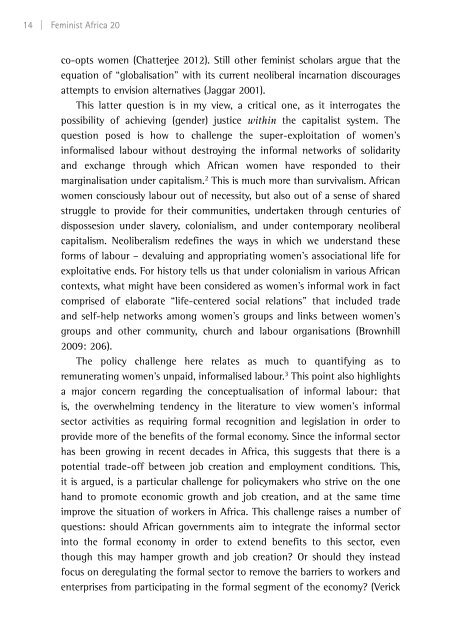Create successful ePaper yourself
Turn your PDF publications into a flip-book with our unique Google optimized e-Paper software.
14 | Feminist Africa 20<br />
co-opts women (Chatterjee 2012). Still other feminist scholars argue that the<br />
equation of “globalisation” with its current neoliberal incarnation discourages<br />
attempts to envision alternatives (Jaggar 2001).<br />
This latter question is in my view, a critical one, as it interrogates the<br />
possibility of achieving (gender) justice within the capitalist system. The<br />
question posed is how to challenge the super-exploitation of women’s<br />
informalised labour without destroying the informal networks of solidarity<br />
<strong>and</strong> exchange through which African women have responded to their<br />
marginalisation under capitalism. 2 This is much more than survivalism. African<br />
women consciously labour out of necessity, but also out of a sense of shared<br />
struggle to provide for their communities, undertaken through centuries of<br />
dispossesion under slavery, colonialism, <strong>and</strong> under contemporary neoliberal<br />
capitalism. Neoliberalism redefines the ways in which we underst<strong>and</strong> these<br />
forms of labour – devaluing <strong>and</strong> appropriating women’s associational life for<br />
exploitative ends. For history tells us that under colonialism in various African<br />
contexts, what might have been considered as women’s informal work in fact<br />
comprised of elaborate “life-centered social relations” that included trade<br />
<strong>and</strong> self-help networks among women’s groups <strong>and</strong> links between women’s<br />
groups <strong>and</strong> other community, church <strong>and</strong> labour organisations (Brownhill<br />
2009: 206).<br />
The policy challenge here relates as much to quantifying as to<br />
remunerating women’s unpaid, informalised labour. 3 This point also highlights<br />
a major concern regarding the conceptualisation of informal labour: that<br />
is, the overwhelming tendency in the literature to view women’s informal<br />
sector activities as requiring formal recognition <strong>and</strong> legislation in order to<br />
provide more of the benefits of the formal economy. Since the informal sector<br />
has been growing in recent decades in Africa, this suggests that there is a<br />
potential trade-off between job creation <strong>and</strong> employment conditions. This,<br />
it is argued, is a particular challenge for policymakers who strive on the one<br />
h<strong>and</strong> to promote economic growth <strong>and</strong> job creation, <strong>and</strong> at the same time<br />
improve the situation of workers in Africa. This challenge raises a number of<br />
questions: should African governments aim to integrate the informal sector<br />
into the formal economy in order to extend benefits to this sector, even<br />
though this may hamper growth <strong>and</strong> job creation? Or should they instead<br />
focus on deregulating the formal sector to remove the barriers to workers <strong>and</strong><br />
enterprises from participating in the formal segment of the economy? (Verick


